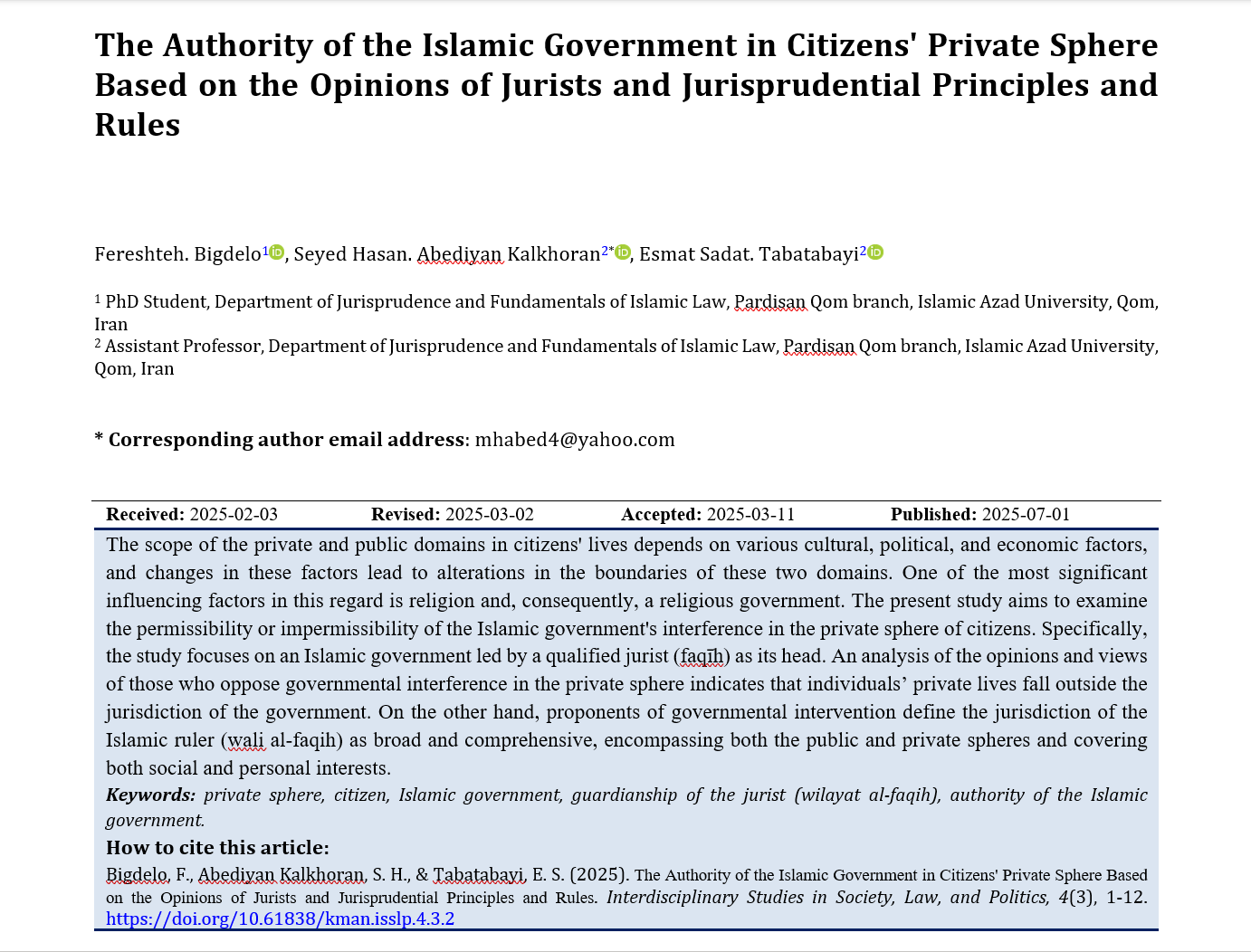The Authority of the Islamic Government in Citizens' Private Sphere Based on the Opinions of Jurists and Jurisprudential Principles and Rules
Keywords:
private sphere, citizen, Islamic government, guardianship of the jurist (wilayat al-faqih), authority of the Islamic governmentAbstract
The scope of the private and public domains in citizens' lives depends on various cultural, political, and economic factors, and changes in these factors lead to alterations in the boundaries of these two domains. One of the most significant influencing factors in this regard is religion and, consequently, a religious government. The present study aims to examine the permissibility or impermissibility of the Islamic government's interference in the private sphere of citizens. Specifically, the study focuses on an Islamic government led by a qualified jurist (faqīh) as its head. An analysis of the opinions and views of those who oppose governmental interference in the private sphere indicates that individuals’ private lives fall outside the jurisdiction of the government. On the other hand, proponents of governmental intervention define the jurisdiction of the Islamic ruler (wali al-faqih) as broad and comprehensive, encompassing both the public and private spheres and covering both social and personal interests
Downloads
References
Akhound Khurasani, M. K. Kifayat al-Uṣul. Qom: Al-Bayt School for the Revival of Arab Heritage.
Al-Hurr al-Amili, M. b. H. (1995). Wasail al-Shi'a (2nd ed.). Qom: Ahl al-Bayt Institute.
Ansari, B. (2014). Private Law. Tehran: Samt.
Ansari, M. (1999). Al-Makasib. Qom: Majma' al-Fikr al-Islami.
Dashti, M. (2000). Tarjumeh Nahj al-Balagha. Qom: Mashhoor.
Dehkhoda, A. (1997). Lughatnameh Dehkhoda. Tehran: Printing Company.
Ibn Manzur, M. b. M., Abd al-Wahhab, A. M., & al-Abidi, M. S. (1995). Lisan al-Arab. Beirut: Dar Ihya al-Turath al-Arabi.
Ibn Shabah Harani, H. b. A. (1985). Tuhaf al-'Uqul fi Ma Ja'a min al-Hikam wa al-Mawa'idh min Al-Rasul (PBUH). Qom: Islamic Publications Office.
Khoei, A. Misbah al-Uṣul. Qom: Da'uri Library.
Khoei, A. (1997). Ajwad al-Taqrirat. Qom: Mustafa Library.
Khomeini, R. H. (2000). Kitab al-Bay' (1st ed.). Tehran: Institute for the Organization and Publication of Imam Khomeini's Works.
Khomeini, R. H. (2005). Islamic Government and the Guardianship of the Jurist in Imam Khomeini's Thought. Tehran: Institute for the Organization and Publication of Imam Khomeini's Works.
Kulayni, M. b. Y. (1986). Al-Kafi. Tehran: Dar al-Kutub al-Islamiyya.
Majlisi, M. T. (1987). Rawdat al-Muttaqin fi Sharh Man La Yahduruhu al-Faqih. Qom: Koushanpour Cultural Institute.
Motahhari, A. (2001). Islam and the Requirements of Time. Tehran: Sadra.
Muhaqqiq Karaki, A. b. H. (1990). Rasa'il. Qom: Ayatollah Marashi Najafi Library.
Naini, M. M., & Khwansari, M. N. Maniyyat al-Talib. Qom: Al-Hamdiyah Library.
Najafi, M. H. (1985). Jawahir al-Kalam. Beirut: Dar Ihya al-Turath al-Arabi.
Narāqi, M. A. b. M. H. (1990). 'Awa'id al-Ayyam. Qom: Al-Basirati Library.
Narāqi, M. A. b. M. H. (1996). Tuhfa Razaviyyah. Qom: Islamic Propagation Office.
Raghib Isfahani, H. b. M., & Dawoodi, S. A. (1993). Mufradat Alfaz al-Quran. Lebanon: Dar al-Ilm.
Shaykh Saduq, M. b. A., & Ghaffari, A. (1995). Man La Yahduruhu al-Faqih (3rd ed.). Qom: Islamic Publications Office.
Tahrani, S. M. H. (2001). Wilayat Faqih in Islamic Government. Mashhad: Allameh Tabatabai.
Tamimi Amadi, A. b. M. (1987). Gharar al-Hikam wa Durar al-Kalim. Qom: Islamic Propagation Office.














